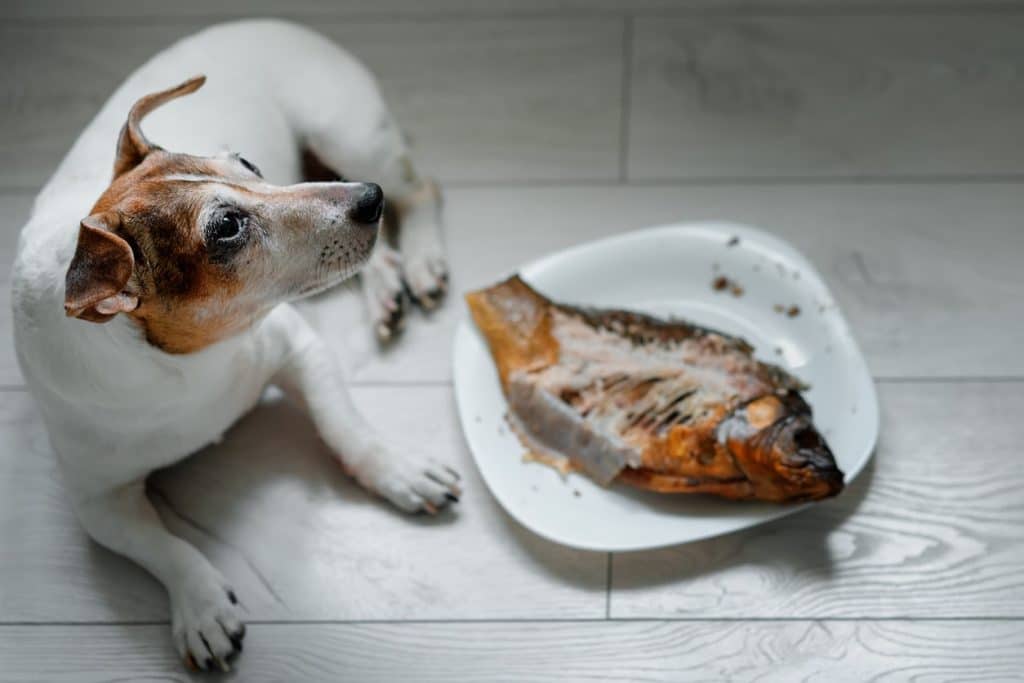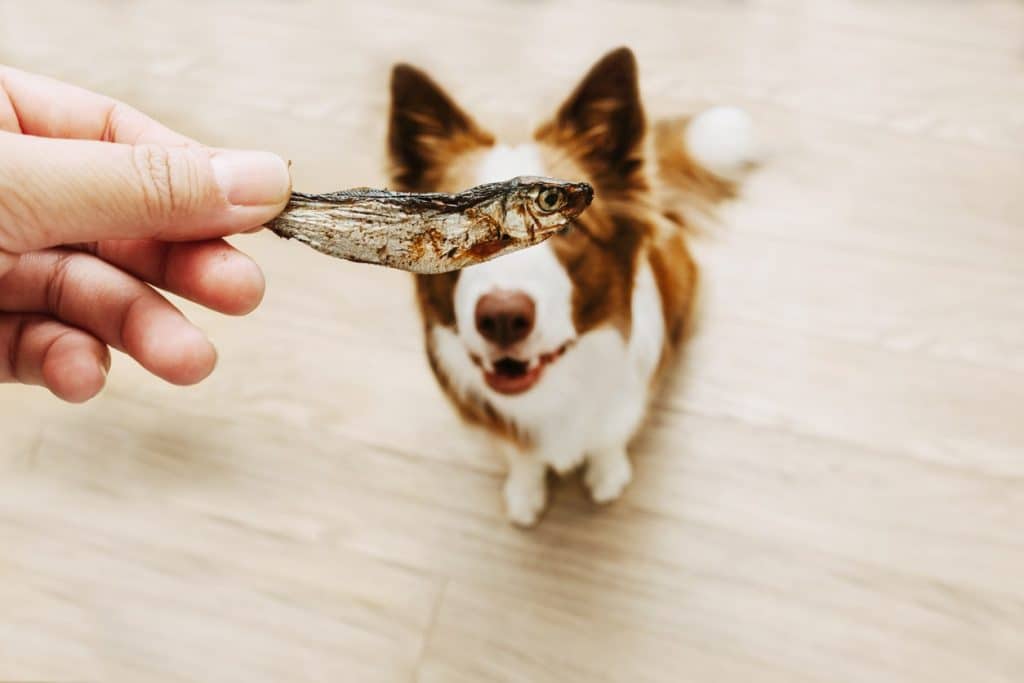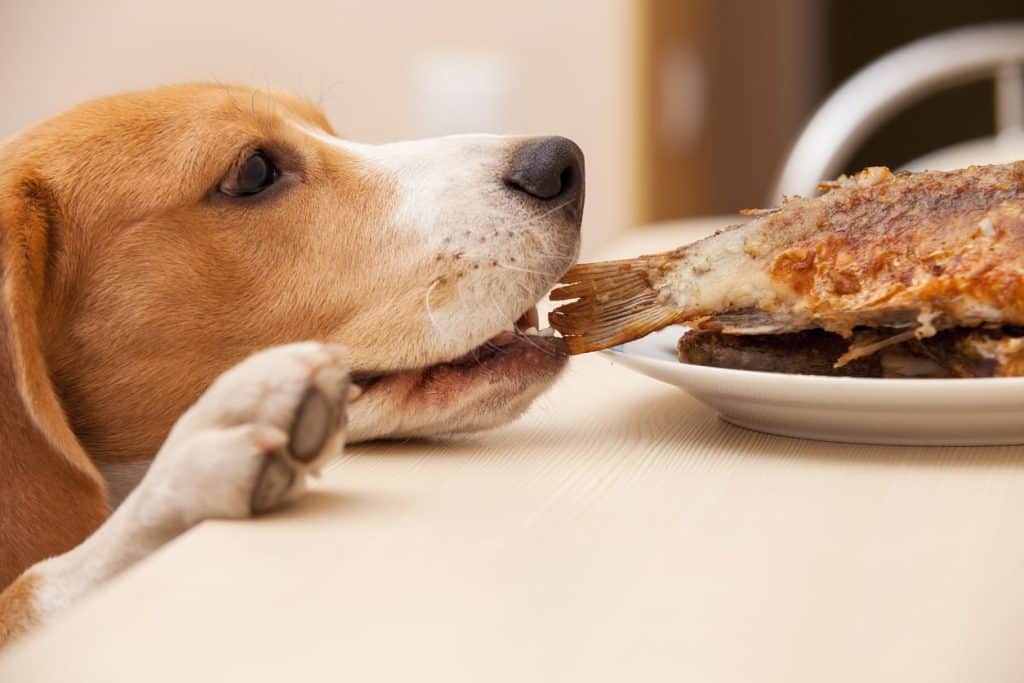- Not a substitute for professional veterinary help.
Lots of human-friendly foods are dangerous for dogs: chocolate, grapes, onions, and garlic, to name but a few. But what about fish? If you’re looking for different foods to mix up your canine’s diet, you’ll be pleased to learn dogs can eat fish.
There are plenty of ways to serve fish. Wild-caught and store-bought varieties are OK to feed your canine as long as they’re pre-cooked and deboned beforehand. Dogs can also eat other types of cooked seafood, such as shellfish, so there are lots of options!
Grab a fishing rod and get ready to reel in some feeding facts about how to safely share fish with your dog.
What Types Of Fish Can Dogs Eat?
Good news! “Dogs can eat any type of fish,” shares Dr. Gary Richter, founder of Ultimate Pet Nutrition, author of Longevity for Dogs, and Rover Dog People panelist. However, some factors affect their safety. For instance, he says fish should be served cooked, as there are concerns with raw fish — especially salmon and trout — due to salmon poisoning.
Another factor to be aware of is mercury. All fish contain some mercury, as bacteria in the water convert atmospheric mercury into organic mercury compounds, where it is absorbed into fish’s tissues. Too much mercury can be toxic to dogs (and humans!), so it’s important to keep intake low.
“We have fewer studies on effects of fish consumption and heavy metals such as mercury in dogs,” explains Laura Gaylord, DVM, DACVIM (Nutrition), a board-certified veterinary nutritionist and founder of Whole Pet Provisions. “However, many pet parents choose to apply similar guidelines as for humans in reducing consumption of these potential contaminants for their pets.” Opt for fish with lower mercury levels, such as sardines, herring, salmon, mackerel, trout, and tilapia. Your pup can still eat tuna but should do so more sparingly.
So what about bones? “Small, flexible bones in fish, such as the ones you find in tinned sardines, are usually not a problem for dogs,” explains Alyssa Ralph, canine nutritionist and behaviorist at Holistic Pet Services. However, it’s still best to check for bones before serving; if you opt for canned fish, make sure it’s in water rather than oil. When it comes to larger fish, bones can present a choking hazard or even lead to a puncture in their digestive tract — ensure these are removed.
Can Dogs Eat Raw Fish?
It’s never a good idea to feed your dog raw fish. Raw fish can contain harmful parasites and bacteria, including E.coli (the bacteria in raw meat that can cause food poisoning).
Salmon poisoning can lead to symptoms including vomiting, lethargy, diarrhea, and even death if left untreated. E.coli can cause similar stomach and intestinal-related afflictions.

iStock/Yaraslau Saulevich
How Should You Prep & Cook Fish For Your Dog?
Cook fish and shellfish for your dog like you would for a human. Ensure it’s reached a minimum internal temperature of 145℉ (62.8℃) before serving (you can use a cooking thermometer to check). If it’s not being served immediately, ensuring the fish is stored correctly is equally important.
“I recommend using the same storage and handling guidelines as for humans provided by the Food and Drug Administration (FDA),” says Gaylord. Put fresh or frozen fish (not canned) into the fridge or freezer immediately after purchase. If refrigerating, ensure the fridge temperature is below 40℉ and serve fish within two days. Keep different types of fish and seafood separately (aka not in the same storage container or plastic wrap) to avoid cross-contamination of bacteria.
When feeding a piece of fish to your dog, Gaylord says they should eat it within 30 minutes. Additionally, she explains if it’s not eaten right away, discard it after 2 hours if left out at room temperature or 1 hour if temperatures are over 90℉.
It’s important to debone and properly cook fish. However, if your dog is swimming in a lake or river and decides to stop for a fishy snack break, don’t panic. “In most cases, the risk is likely very low for illness,” Gaylord assures. However, monitor your dog for ay GI symptoms such as food refusal, vomiting, or diarrhea. If you’re concerned, contact your veterinarian for assessment and help.
We’ve already covered the temperature for cooking fish, but what about cooking methods? Ralph says all the following are suitable “as long as extra oil is avoided”:
- Roasting
- Boiling
- Grilling
- Poaching
- Steaming
- Braising
- Air frying
Due to the amount of oil required in frying, Ralph recommends avoiding it. She adds that a 2022 study found steaming to be the best cooking method since it preserves nutrients. Aside from avoiding oil, it’s best to cook fish plain. Usual ‘human’ seasonings, such as garlic, black pepper, and salt, can lead to concerns ranging from stomach upset to toxicity.
Is Fish Good For Dogs?
Fish contain a wide range of vitamins, minerals, and nutrients good for dogs, including the following.
- Vitamin D
- Calcium
- Phosphorus
- Iron
- Zinc
- Iodine
- Magnesium
- Potassium
“All of these are important for optimal body function, immune system support, and keeping the body strong and healthy,” says Richter.
Protein
Fish is also a great protein source: for instance, a 100g piece of salmon contains around 22g of protein! Protein is vital for building and supporting your dog’s muscles, tendons, skin, nails, and nervous system. It’s important not to get carried away, though — as excessive protein consumption in dogs has been linked to changes in gut bacteria, inflammation, and kidney dysfunction. Ask your vet or a dog nutritionist if you’re unsure how much protein to feed your canine.
Omega-3 fatty acids
“Fish contains high levels of omega-3 fatty acids, which are very beneficial to both animals and humans,” Richter explains. Research has linked omega-3 in dogs to improved vitality, coat appearance, metabolism, and lower heart disease risk. Additionally, dogs can get omega-3 through fish oil.
Does Fish Present Any Risks for Dogs?
We’ve already discussed the potential hazards posed by fish bones, food poisoning from raw or improperly cooked fish, and high mercury consumption. But they’re not the only hazards of fish for dogs. Here are a few more fish risks to keep in mind.
High-fat content
Fish such as salmon, mackerel, and tuna, have high fat content. “These are considered mostly healthy fats, including the omega-3 fatty acids,” Gaylord explains. “However, for dogs with sensitive gastrointestinal tracts, a history of pancreatitis, or fat intolerances, these fish may not be appropriate.”
In these instances, she notes leaner fish with lower fat content (such as whitefish, which includes cod and haddock) may be a better option. When in doubt, she says to confirm with your veterinarian.
Nutritional imbalances
“Ingestion of large amounts of whole fish may create nutrient imbalances, including excesses of vitamin D, calcium, phosphorus, or calories,” Gaylord says. High calorie intake can result in weight gain, while excess vitamin D may cause toxicity.
To help keep your dog safe, she says to limit fish consumption and give it as an occasional treat. “The total amount of treats fed per day should be limited to no more than 10% of your dog’s calories,” she explains. “This is to avoid unbalancing the daily diet or causing inappropriate weight gain.”
Allergies and sensitivities
Dogs can be allergic and intolerant to various food ingredients — including fish! Fortunately, fish allergies aren’t as common as those to dairy, wheat, or eggs.
If your dog has existing food allergies and sensitivities (including fats), Gaylord says to check with your vet to ensure offering fish is safe and appropriate.

iStock/smrm1977
How Much Fish Can A Dog Safely Eat?
How much to feed your dog depends on numerous factors, including their age, weight, breed, and activity level. As for the appropriate levels of fish you can feed a dog, Richter says there’s no specific safe serving. For example, while excessive levels of mercury can be harmful, he says this can’t be correlated to how much fish is safe to eat since some types of fish contain more heavy metals than others.
If you want to give fish as a regular treat, Richter explains that they can eat it daily as part of their diet. Just remember that the amount they eat shouldn’t exceed more than 10% of their daily calorie intake, and some options are healthier than others regarding fat and nutritional content.
4 Delicious Fish Recipes Your Dog Will Love
Want to incorporate fish into some delicious dishes for your four-legged friend? Look no further!
Baked salmon patties
This recipe, shared by Gaylord, will have your dog hankering for meal times. However, “these are for supplemental or intermittent feeding only, and not intended to be a complete and balanced food or meal replacement,” she notes.
Yield: 30 Kcal: 52
Ingredients:
16 oz cooked salmon (fresh or frozen)
1 cup plain breadcrumbs
1 cup oat flour (or any flour)
2 eggs, whole
1-2 tbsp water, or as needed
Optional: 1-2 tbsp of diced fresh parsley; a pinch of Morton’s Lite Salt
Method:
- Mix all ingredients into a dough, adding more water if additional moisture is needed.
- Divide into smaller balls (approx. 30 small ones).
- Flatten into small patties or discs and place on a baking sheet.
- Bake at 350℉ (180) until cooked through, approximately 25-30 minutes.
- Remove from oven and leave to cool before serving.
Simple purees
By pureeing leftover cooked fish (such as salmon or tuna) and blending it with a dash of hot water, you can make a tasty puree that will make the perfect accompaniment for their favorite meals.
Homemade salmon jerky
If you’ve got some leftover salmon (or whitefish), why not make chewy jerky strips for your canine to get their teeth into? Simply coat strips of fish in a homemade marinade before leaving to absorb for 24 hours. Place them in a dehydrator for several hours, and voila!
Salmon swirl cookie bites
All you need to make these tempting bite-sized treats is a tin of canned salmon, some oat flour, and a couple of eggs! Prepped and baked in under an hour, you’ll love this super speedy recipe.

iStock/Solovyova
Can Dogs Eat Shellfish & Other Seafood?
Your pup isn’t only restricted to fish: they can also eat shellfish and other seafood! This includes smaller options, such as mussels, oysters, clams, and cockles, and larger shellfish, including crab and lobster.
Make sure any shellfish you give your dog is fresh and properly cooked through. Additionally, only give them the ‘meat’ of the shellfish, and remove any shell. Shell pieces typically have sharp edges, which pose a choking hazard and can hurt your dog’s insides. Finally, if your dog accidentally eats any shell, call your vet immediately.


